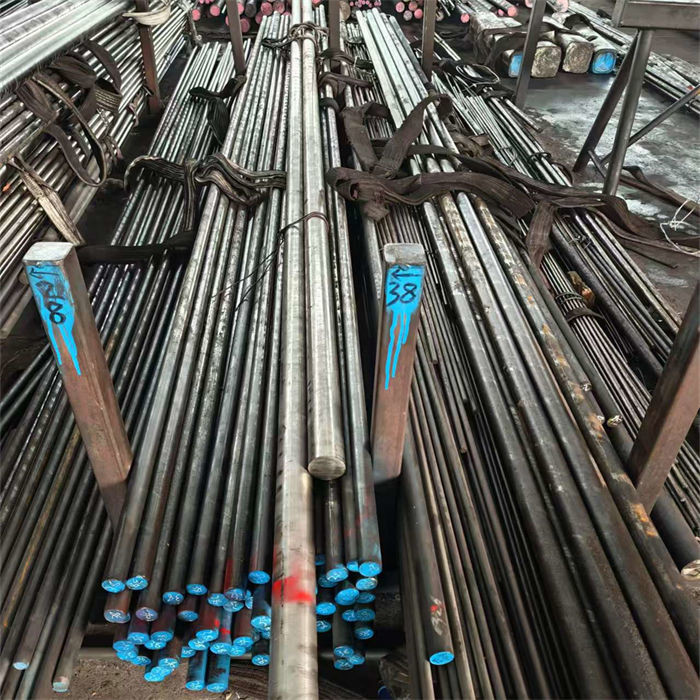High Strength CD4MCu Round Steel 0Cr26Ni5Mo2Cu3 Forged Rod Duplex
Stainless Steel Rod.

Material introduction: Full name of brand: 0Cr26Ni5Mo2Cu3
Alloy CD-4MCu is nominally 26Cr-6Ni alloy (C≤0.04) with molybdenum
and copper added. There is no corresponding deformed steel for this
alloy. Alloy CD-4MCu is a two-phase structure in the cast state,
consisting of austenite distributed in a ferrite matrix. Although
carbide precipitation is limited by the minimum carbon content of
the alloy, if it is not eliminated by solution treatment, it will
also be dispersed in the ferrite matrix, thereby reducing corrosion
resistance. The solution treatment temperature of CD-4MCu is 1120℃,
and it is kept warm for at least two hours to ensure uniform
temperature, and then slowly cooled to 1010~1065℃, kept warm for
half an hour, and then quenched. Keeping warm at a lower
temperature is to avoid cracking of castings (especially castings
with thicker sections) during quenching. The structure after heat
treatment is also two-phase, containing 35~40% austenite in the
ferrite matrix.
Alloy CD-4MCu is basically ferritic, with a yield strength of about
twice that of 19Cr-9Ni austenitic alloy, and has high hardness,
good tensile plasticity and satisfactory impact toughness. The high
strength and hardness of the alloy are combined with excellent
corrosion resistance, making it particularly suitable for use under
corrosive (including abrasion and erosion) working conditions.
Alloy CD-4MCu has better corrosion resistance than CF alloy in many
corrosive media, and is widely used in strong acid working
conditions of oxidation and reduction, and has special resistance
to stress corrosion cracking in chlorine environments.
After solution treatment, CD-4MCu alloy can be further strengthened
by precipitation hardening caused by aging at 480-510℃. The degree
of aging reaction, as well as all the properties of the alloy in
the aged state, including corrosion resistance, strength, impact
toughness and quenching cracking tendency are related to the
complex phase treatment method, that is, the high or low solution
treatment temperature, aging temperature and aging time. Because
the alloy has sufficient strength and excellent corrosion
resistance in many applications after solution treatment, it is not
often used in the aged state.

The chemical composition of CD4MCu mainly includes the following
elements and their contents:
Carbon (C): ≤0.04%
Manganese (Mn): ≤1.0%
Silicon (Si): ≤1.0%
Phosphorus (P): ≤0.04%
Sulfur (S): ≤0.04%
Chromium (Cr): 24.5% - 26.5%
Nickel (Ni): 4.75% - 6.00%
Molybdenum (Mo): 1.75% - 2.25%
Copper (Cu): 2.75% - 3.25%
| C | Mn | Si | P | S | Cr | Ni | Mo | Cu |
| ≤0.04% | ≤1.0% | ≤1.0% | ≤0.04% | ≤0.04% | 24.5% - 26.5% | 4.75% - 6.00% | 1.75% - 2.25% | 2.75% - 3.25% |
These chemical compositions are the basis of CD4MCu's performance,
giving it excellent corrosion resistance and mechanical properties.
CD4MCu is a high-performance cast duplex stainless steel, widely
used in chemical, papermaking, food processing, marine engineering
and other fields, especially in the manufacture of pumps, valves
and other components.
The hardness of CD4MCu stainless steel is usually between HB200-320
and the density is about 7.8g/cm³.
| hardness | HB200-320 |
| density | 7.8g/cm³ |
Advantages and Disadvantages of Corrosion Resistant Alloy CD4MCu.
Corrosion Resistant Alloy CD4MCu is an alloy material with
excellent performance in high temperature and corrosive
environments. It is composed of a variety of elements, including
chromium, nickel, cobalt, tungsten, etc., which give CD4MCu
excellent corrosion resistance and high temperature strength
properties. However, like any material, CD4MCu also has its own
advantages and disadvantages.
Advantages:
1. High temperature strength: CD4MCu can still maintain high
strength at high temperatures, making it an ideal choice for
equipment that needs to withstand high temperatures and heavy
loads.
2. Corrosion resistance: The alloy has excellent corrosion
resistance and can resist erosion by various acids, alkalis, salts
and other chemicals. This makes CD4MCu widely used in chemical,
petroleum, pharmaceutical and other fields.
3. Good welding performance: CD4MCu is easy to weld, and the
material properties remain good after welding. This reduces the
difficulty of maintenance and repair and improves the reliability
of equipment.
4. Long life: Due to its excellent corrosion resistance and high
temperature strength properties, CD4MCu has a long service life,
reducing the frequency and cost of equipment replacement.
5. Good processing performance: CD4MCu is easy to process and
manufacture, and can adapt to various complex shapes and
structures. This reduces the difficulty and cost of manufacturing.
Disadvantages:
1. High cost: Since CD4MCu is a high-performance alloy material,
its manufacturing cost is high. For some projects that require a
large amount of this material, the budget may be limited.
2. Brittleness: CD4MCu may exhibit brittleness under certain
conditions, which may cause sudden cracks or breaks in the
equipment during operation. Therefore, special attention should be
paid to its operating environment and conditions when using CD4MCu.
3. Sensitivity and environmental factors: CD4MCu is sensitive to
certain chemicals and environmental factors, such as chloride ions,
hydrogen sulfide, etc. Special attention should be paid to these
factors when using CD4MCu to avoid adverse effects on its
performance.
In short, the corrosion-resistant alloy CD4MCu has many advantages,
making it an ideal choice in many fields. However, it is also
necessary to pay attention to its disadvantages and take
corresponding measures to ensure its safe and reliable use. When
selecting and using CD4MCu, it is necessary to evaluate and make
decisions based on actual needs and conditions.












